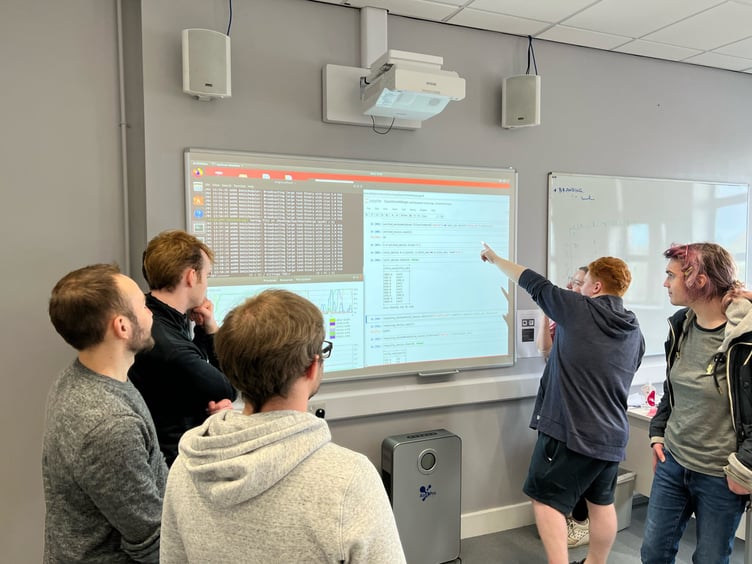University College Isle of Man (UCM) is closely monitoring the developments of a new artificial intelligence chatbot.
Launched less than two months ago, ChatGPT is already changing the way that some university lecturers are thinking of marking and assessing work.
ChatGPT is an artificial intelligence tool in which anyone can ask it a question, and it will respond with detail and for the most part, accuracy.
From explaining quantum mechanics to writing sonnets, ChatGPT provides a breadth of information written with human-like responses.
The chatbot was launched in November 2022 by OpenAI.
In the last fortnight, Microsoft said that it will invest $10 billion in OpenAI, according to Bloomberg.
Since its launch, there have been concerns in higher education that students would use artificial intelligence to complete essays and assignments.
Dr Alistair Robertson, a lecturer in computer science at UCM, and machine-learning specialist, said: ‘In my domain area, big data analytics, and the AI that spins up on it, I asked it a raft of questions around that, and it was actually giving some pretty good responses.
‘However, it did not have the depth that I would expect a very good student to produce.
‘It would give a student a head start in understanding the domain area, and then they could plug it in.
‘The responses would probably be the level of a year one university student, but for a third-year student we would expect a much higher output than it will generally produce.’
If you ask ChatGPT to write a 2,000 word essay in an academic style, it will do so, although Dr Robertson explained that it is not always 100% accurate.
We asked ChatGPT to explain how the programme works.
This was the response: ‘ChatGPT is based on the transformer architecture, which is a type of neural network used for processing sequential data.
‘It has been trained on a large corpus of text data from the internet, allowing it to generate human-like responses to a given prompt.
‘The model uses a combination of statistical language modelling techniques and deep learning to generate responses, based on the patterns it learned from the training data.’
We then asked ChatGPT to explain this in simpler terms: ‘ChatGPT is an AI model that can generate text.
‘It works by looking at a prompt and predicting what the next words in the response should be, based on what it learned from vast amounts of text data.
‘The model is built using deep learning, which is a type of artificial intelligence that can identify patterns in data and use that to make predictions.
‘Essentially, it works by using patterns it learned from lots of text to try and respond in a way that seems like it was written by a human.’
Dr Robertson (pictured right) said: ‘ChatGPT sits mainly with the reinforcement model where it self-learns, so you give it data, you give it a broad idea of what to look for, and then it gradually builds up its understanding of the world from data that you feed to it.’
He said that if you ask Chat GPT the same question multiple times: ‘It will be slightly different depending on what it has been doing that day.
‘It’s like a human being really, if you asked me the same question three times. I’ll generally give you the same thing in a certain direction, but worded slightly differently.
‘The point is right now, the written word from ChatGPT is slipping through the net.’
Dr Robertson is not worried about this in the long-term, due to a software which universities use called Turnitin, which checks assignments for plagiarism.
He said: ‘We already have a tool in higher education called Turnitin.
‘It auto verifies whether that’s the student’s work or not, just by looking at quotations within it, referring that against all generated academic material, all previous student material, and all websites that have ever existed.
‘A student submits that and about a week later, we get a Turnitin score of between zero and 100% of how much copying has actually taken place.
He added: ‘Once you get a couple of hundred essays through the system from ChatGPT, they’ll start repeating the last chat GPT entry.
‘Even in a Turnitin case where a student submitted an essay, and they’ve got a ChatGPT response in a chapter or a paragraph within that, once two or three students have used it, our system will pick that up anyway. Because it’ll have been used two or three times by two or three different students.
‘So the first student might get lucky, the second one will find it harder to, and the third one will get caught.’
He added: ‘I would like for every module that has a Turnitin submission box, that we put it through Chat GPT a week earlier, and so we have a record of what ChatGPT would say at the time of submission.
‘The person that would use ChatGPT is the struggling student, writing right up to the deadline, so we just need to stay ahead of the game.’
‘I am not worried about ChatGPT in the classroom, or in student outputs of work, if it gets bad then we will just revert to verbal or oral assessments or exams, that fixes the problem entirely.
‘Fundamentally when we send a student out the door with a qualification, they’ve got to have the knowledge to the level that we grade them to.
‘That’s the fundamental learning outcome for an entire institution, so it’s just more a question of if things become problematic then we change behaviours ourselves, do things in a different way and examine people more.’
He said that ChatGPT was not a concern for the younger students at UCM, aged 16 to 18.
He said: ‘It’s safe for the younger age groups in the A-level or GCSE-type programmes.
‘We’re not particularly worried because we know the students and what they’re capable of, you’ll soon detect if something’s too good.’
Gail Corrin, higher education manager at UCM, said: ‘The awarding of a degree is valuable, and employers and the public need to have confidence that the award represents the true knowledge and ability of the person holding it.
‘Students have the right to expect fairness and know that marks and credit are only awarded for their hard work.
‘So ensuring academic integrity is taken very seriously at UCM as it is in all higher education institutions.
‘We spend a lot of time supporting students to maintain that integrity and act swiftly if it is thought to have been breached.
‘UCM has not had any cases of ChatGPT usage, indeed any breach of academic integrity is very rare at UCM.
‘Certainly ChatGPT makes detection difficult but there will be concurrent improvements in software to better detect.
‘Whilst some academics are suggesting a return to written or spoken assessments at the moment the prevalence of ChatGPT would not warrant such a change and UCM already uses a range of assessment methods.
‘One thing ChatGPT can’t do is develop the interpersonal skills and attributes that students need and want to be successful. UCM with its partner the University of Chester, will be watching developments in ChatGPT closely and amend practices if and when necessary.
Yet Dr Robertson believes this is only the very early stages of artificial intelligence.
He said: ‘Artificial intelligence is here to stay, so we just need to harness it.’
He added: ‘These things can grow very fast.
‘This technology is there, we’ve got all the deep faking going on. It’s the same underlying technology, it’s just done in a different way.
‘My main concern is what’s going to be real and what’s not.
‘You can actually ask this new ChatGPT to write an article for you and then auto publish it onto a blog.
‘So suddenly, who are you reading this from? And what if it’s fake information?’

.jpg?width=209&height=140&crop=209:145,smart&quality=75)



Comments
This article has no comments yet. Be the first to leave a comment.